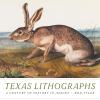1826-1850

|
Texas Lithographs: A Century of History in Images | Join us as scholar Ron Tyler discusses his latest publication Texas Lithographs: A Century of History in Images. Westward expansion in the United States was deeply intertwined with the technological revolutions of the nineteenth century, from railroads to telegraphy. Among the most important of these, if often forgotten, was the lithograph. Before photography became a dominant medium, lithography—and later, chromolithography—enabled inexpensive reproduction of color illustrations, transforming journalism and marketing and nurturing, for the first time, a global visual culture. |